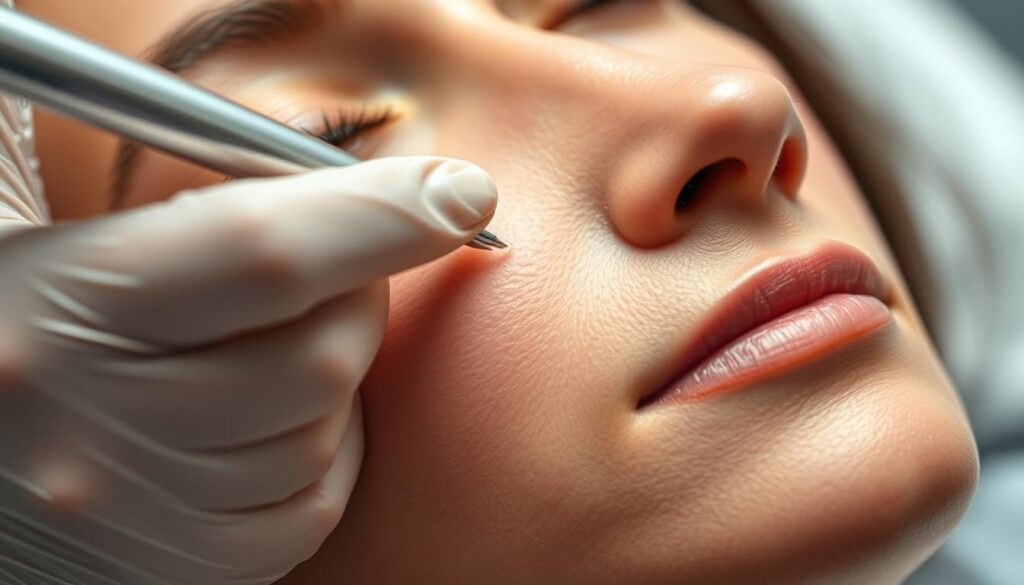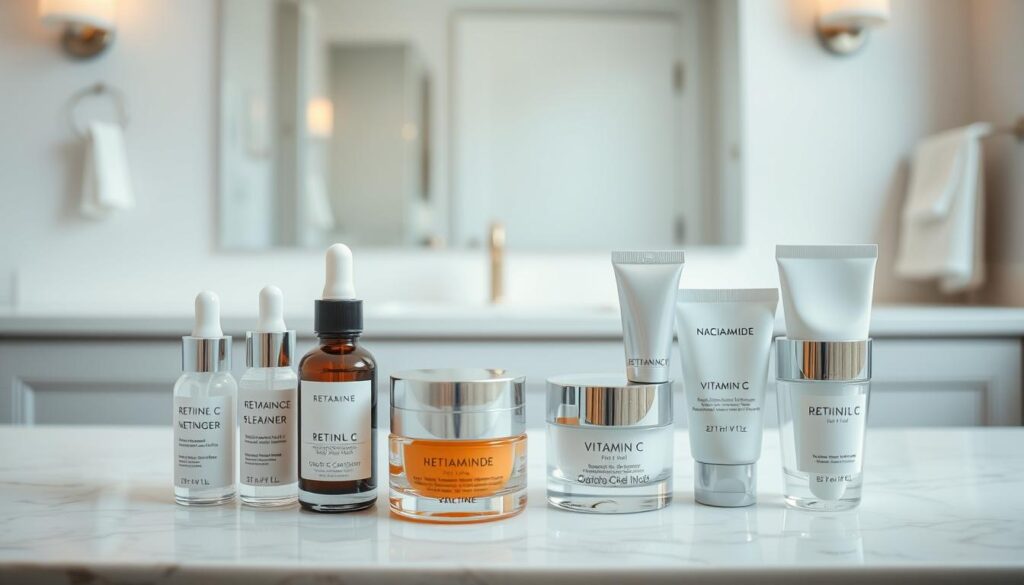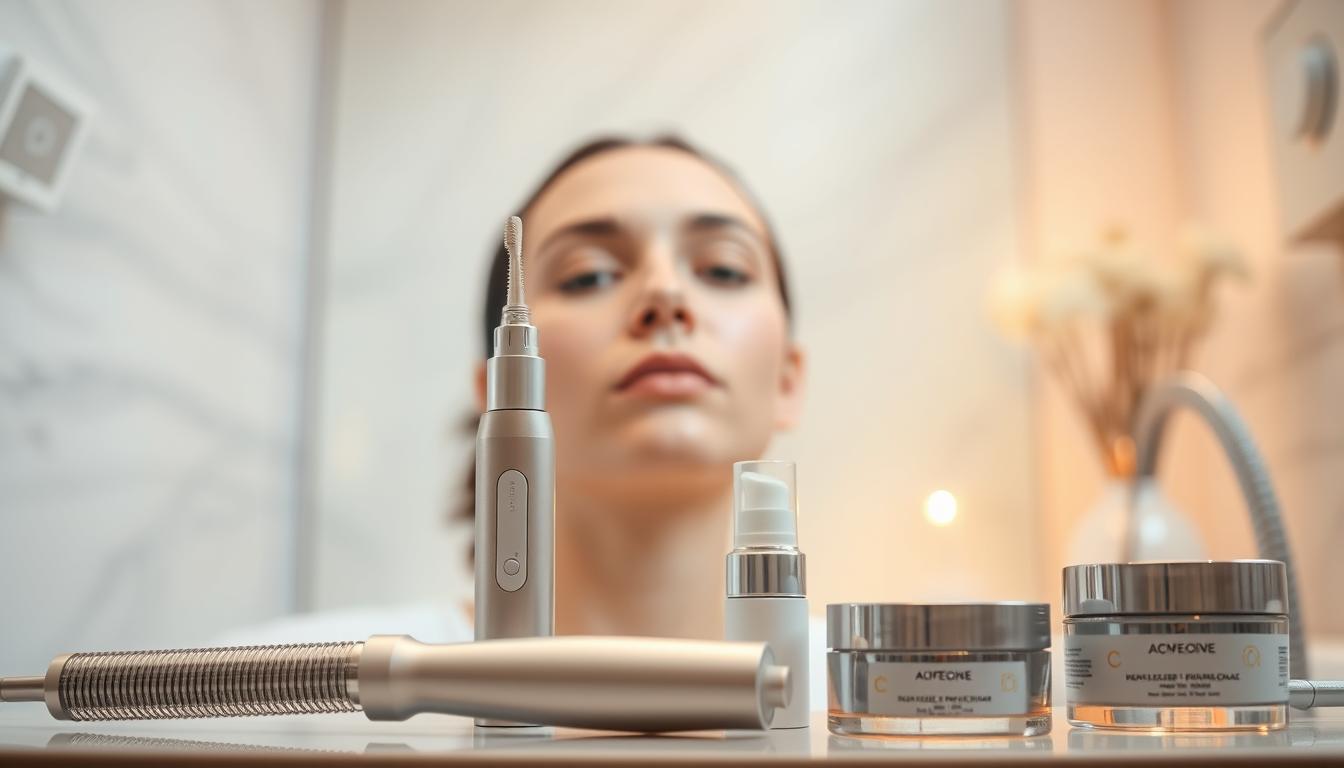Did you know that nearly 80% of people with acne will get scars? These scars can last long, affecting your skin and confidence. Luckily, many dermatologist-recommended treatments can help you get smoother skin.
Knowing your scar type is key to finding the right treatment. There are many ways to tackle acne scars, from professional treatments to home care. This article will look at effective treatments and what you can expect.
Key Takeaways
- Understanding your acne scar type is key to finding the right treatment.
- Dermatologist-recommended treatments include both professional procedures and home remedies.
- Chemical peels and microneedling are effective for acne scars.
- Good skincare routines are important for managing and preventing scars.
- Seeing a dermatologist is vital for a treatment plan that fits you.
Understanding Acne Scars: Types and Causes
Dealing with acne scars starts with knowing their types and causes. Acne scars fall into two main groups: atrophic (depressed) and hypertrophic (raised). Each type needs a different treatment approach.
Atrophic scars include boxcar, ice pick, and rolling scars. Knowing these types helps you choose the best treatment.
Boxcar Scars
Boxcar scars are wide and U-shaped. They are harder to treat because of their size. Treatments for boxcar scars often focus on resurfacing and collagen stimulation.
Ice Pick Scars
Ice pick scars are narrow and deep. They are small but can be very noticeable. Professional treatments like chemical peels and microneedling can be effective in reducing their appearance.
Rolling Scars
Rolling scars have a wavy look due to skin damage. They can be treated with methods that help the skin heal.
Acne scars happen because of inflammation from acne. When acne goes deep into the skin, it can damage tissue and affect collagen. Knowing this helps you choose between professional treatments and home remedies.
| Scar Type | Description | Common Treatments |
|---|---|---|
| Boxcar Scars | Wide, U-shaped | Resurfacing, Collagen Stimulation |
| Ice Pick Scars | Narrow, Deep | Chemical Peels, Microneedling |
| Rolling Scars | Wavy Appearance | Collagen Remodeling Treatments |
Understanding acne scar types and causes helps you make better treatment choices. You can choose professional treatments or try home remedies.
The Role of Dermatologists in Acne Scar Treatment
Treating acne scars well needs a dermatologist’s help. They give expert advice and treatments that fit your skin and scars.
When to Seek Professional Help
If home treatments don’t work, it’s time to see a dermatologist. Dermatologists can check your scars and suggest the best treatments. They guide you through options like chemical peels, microneedling, fillers, and laser therapy.
Benefits of Professional Treatments
Professional treatments work faster and better. Choosing dermatologist-approved acne scar remedies can really improve your scars. These treatments are made just for you, which means less risk of harming your skin.
- Personalized treatment plans based on your skin type and scar characteristics.
- Access to advanced treatments like chemical peels, microneedling, and laser therapy.
- Faster and more effective results compared to over-the-counter treatments.
Chemical Peels: A Quick Overview
Chemical peels are a top choice for reducing acne scars. They work by applying a solution to remove the skin’s top layers. This makes scars less visible and skin smoother.
How They Work
Chemical peels are simple yet effective. A solution is applied to the skin, causing it to peel off. This reveals smoother, less scarred skin. The peel’s depth can be adjusted, depending on the chemical used.
Key to successful treatment is understanding that chemical peels stimulate collagen production. This is vital for skin rejuvenation. It not only reduces scars but also improves skin texture.
Types of Chemical Peels
There are many types of chemical peels, each with its own benefits. Glycolic acid peels are great for deep scars. TCA (Trichloroacetic Acid) peels are versatile, treating various skin issues.
- Glycolic acid peels for deeper penetration
- TCA peels for versatility in treatment
- Mandelic acid peels for sensitive skin
Recovery Time
Recovery time depends on the peel’s depth. Superficial peels need little downtime. Deeper peels require several days to a week. Always follow your dermatologist’s post-treatment care for best results.
Microneedling: What to Expect
Have you heard about microneedling for acne scars? It’s a treatment that uses tiny needles to make micro-injuries in your skin. This stimulates collagen production and helps your skin renew itself. It’s a dermatologist-recommended treatment that’s becoming popular for its ability to improve skin texture and reduce acne scars.
Procedure Details
A microneedling session involves a device with fine needles moving over your skin. This creates micro-injuries that start a healing process. It also boosts collagen production and skin elasticity. The whole process usually takes 30 minutes to an hour, depending on the area treated. You might feel some discomfort, but topical anesthetics can help reduce this.

Benefits of Microneedling
Microneedling does more than just treat acne scars. It can make your skin look smoother and more radiant. It stimulates collagen production, which helps fill in depressed scars. This makes your skin look more even. As a fast acne scar treatment, it’s a good choice for those who want quick results without invasive procedures.
Post-Treatment Care
After microneedling, it’s important to follow a good skincare routine. Keeping your skin moisturized and protected from the sun is key. Also, avoid harsh skincare products for a few days after treatment. By doing these simple care tips, you can get the best results from your microneedling treatment.
Laser Therapy: Effective Options for Scars
Laser therapy is a top choice for getting rid of acne scars. It uses laser light to boost collagen, making skin look better and scars less noticeable.
Ablative vs. Non-Ablative Laser Treatments
There are two main laser treatments for acne scars: ablative and non-ablative. Ablative lasers remove the top skin layers to help tighten and produce new collagen. On the other hand, non-ablative lasers work by boosting collagen without removing the top skin, leading to less downtime.
Studies show that ablative lasers are more intense and need longer to heal. But, they can give deeper scars a more dramatic fix.
Recovery and Results
The healing time for laser therapy depends on the laser type. Ablative lasers need more time to heal, with the skin looking red and swollen. Non-ablative lasers heal faster, with fewer side effects.
Results from laser therapy are noticeable, with improvement seen over months as collagen builds up. A dermatologist notes, “Laser therapy can greatly enhance acne scar appearance, but patience is key as full results take time.”
Multiple Sessions: What to Know
Getting the best results often means more than one laser therapy session. The number of sessions needed varies based on scar severity, skin type, and laser type. A dermatologist will create a custom plan for you to get the best results.
- Usually, 3 to 5 sessions are advised, with breaks of several weeks in between.
- Each session is adjusted based on how you’re responding and progressing.
- It’s important to follow post-treatment care to get the most out of your treatment and avoid side effects.
Dermal Fillers: Temporary Solutions
Dermal fillers are a quick fix for acne scars. They’re great for filling in depressed scars and giving you instant results.
Types of Fillers Used
There are different dermal fillers for acne scars, like hyaluronic acid and calcium hydroxylapatite. Hyaluronic acid fillers are safe and look natural. Calcium hydroxylapatite fillers last longer.
Results Duration
The results last different times based on the filler. Hyaluronic acid fillers last 6 to 12 months. Calcium hydroxylapatite fillers can last up to 2 years or more. Knowing how long they last helps plan for future treatments.
Ideal Candidates
Dermal fillers work best for those with mild to moderate acne scars. They’re perfect for boxcar and rolling scars. They’re for those wanting a quick fix before a more lasting treatment.
| Filler Type | Duration of Results | Ideal Use |
|---|---|---|
| Hyaluronic Acid | 6-12 months | Temporary improvement, less invasive |
| Calcium Hydroxylapatite | Up to 2 years or more | Longer-lasting results, deeper scars |
It’s important to talk to a qualified professional. They can pick the right filler for you. They ensure the treatment is safe and done right.
Home Remedies: Can They Help?
Some home remedies can help with acne scars, even though professional treatments are often advised. Adding these remedies to your skincare routine might make scars less noticeable.
Popular Ingredients
Many home remedies use ingredients that can help with acne scars. These include:
- Vitamin C: It’s an antioxidant that boosts collagen and improves skin texture.
- Retinoids: These are vitamin A derivatives that help renew skin and reduce scars.
- Alpha Hydroxy Acids (AHAs): AHAs, like glycolic acid, exfoliate the skin, making it smoother and scars less visible.
For more on these ingredients, check out Medical News Today for more details.
Limitations of Home Treatments
Home remedies have their limits. They might not work as well for deep or severe scars. For these, you might need professional treatments like chemical peels or laser therapy.
It’s important to have realistic expectations with home remedies for acne scars. If you’re worried about your scars, talking to a dermatologist can help. They can give you advice tailored to your needs.
The Importance of Skincare Routine
Having a regular skincare routine is key to reducing acne scars and keeping your skin healthy. Spending a few minutes each day on your skin can greatly improve its look and feel over time.

Daily Care Tips for Scars
To take good care of your skin and lessen acne scars, follow these daily tips:
- Keep your skin clean by washing it twice a day with a gentle cleanser.
- Use a sunscreen with at least SPF 30 daily to prevent further damage.
- Incorporate products containing retinoids and vitamin C, which are known to help reduce scarring.
- Exfoliate regularly to remove dead skin cells and promote skin renewal.
Ingredients to Look For
When picking skincare products, look for ingredients that help with acne scars. Some of the best include:
- Retinoids: Derivatives of vitamin A, retinoids help promote cell turnover and collagen production.
- Vitamin C: A powerful antioxidant, vitamin C brightens the skin and helps reduce the appearance of scars.
- Hyaluronic Acid: This ingredient helps retain moisture in the skin, improving its elasticity and texture.
- Niacinamide: Known for its ability to improve skin hyperpigmentation, niacinamide can help reduce the appearance of acne scars.
By adding these ingredients to your daily skincare routine and staying consistent, you can get fast acne scar treatments. You’ll enjoy healthier, more radiant skin.
Lifestyle Changes to Support Skin Health
Many lifestyle factors, like diet and stress, can affect acne scars. Making smart choices can help your skin and make treatments work better.
Diet and Nutrition
Eating well is key for healthy skin. Include fruits, veggies, and omega-3s in your diet. Antioxidant-rich foods like berries and leafy greens fight inflammation and help skin heal.
Foods high in vitamin C, like citrus fruits and bell peppers, boost collagen. This is important for skin flexibility.
Nutritional Tips:
- Eat a variety of colorful fruits and veggies.
- Choose lean proteins and whole grains.
- Avoid processed foods and sugars that cause inflammation.
Hydration Importance
Drinking enough water is vital for skin health. It helps remove toxins and keeps your skin looking good. Drink at least eight glasses a day, more if you’re active or live in a hot climate.
Stress Management Techniques
Stress can make skin problems worse, like acne and scarring. Try stress-reducing activities like meditation, yoga, or exercise. These not only help your skin but also improve your overall health.
Try these stress-reducing activities every day:
- Practice mindfulness or meditation daily.
- Do physical activities you enjoy.
- Make sure you get enough sleep each night.
By changing your lifestyle, you can help your skin and reduce acne scars. Adding these habits to Effective Acne Scar Solutions and Dermatologist-Recommended Treatments will give you the best results.
Seeking the Best Dermatologist for Scar Treatment
Finding the right dermatologist is key for treating acne scars. You need someone who offers Professional Acne Scar Treatments that fit your skin and needs.
When looking for a dermatologist, check their qualifications, experience, and patient feedback. Make sure they have a good track record with Dermatologist Approved Acne Scar Remedies. This ensures you’re in safe hands.
Key Qualities to Look For
A great dermatologist has lots of experience with acne scars. They should be able to look at your skin and suggest the best treatments.
Preparing for Your Consultation
At your consultation, ask about their approach to your acne scar type. Talk about the treatments they suggest, what results you can expect, and how long it will take to recover. This helps you make a smart choice for your care.
Choosing the right dermatologist leads to the best results for your Professional Acne Scar Treatments. Start your journey to smoother, healthier skin today.
FAQ
What are the most effective dermatologist-recommended treatments for acne scars?
Dermatologists suggest treatments like chemical peels, microneedling, laser therapy, and dermal fillers. These options are tailored to your skin and scars. They work faster and better than over-the-counter products.
How do I determine the type of acne scar I have?
Knowing your scar type is key to choosing the right treatment. Boxcar scars are wide and U-shaped, ice pick scars are narrow and deep, and rolling scars are wavy. A dermatologist can help identify your scar type and suggest the best treatments.
Can home remedies help reduce the appearance of acne scars?
Home remedies can help with acne scars, but they vary in effectiveness. Vitamin C, retinoids, and alpha hydroxy acids can aid in skin renewal and collagen production. Yet, for deeper scars, professional treatments might be needed.
What is the role of a dermatologist in acne scar treatment?
Dermatologists offer expert advice and treatments for acne scars. They assess your scarring and suggest treatments like chemical peels, microneedling, fillers, and laser therapy.
How can I support skin health through lifestyle changes?
Supporting skin health through lifestyle changes is important. Eating a balanced diet with fruits, vegetables, and omega-3 fatty acids helps. Drinking enough water keeps your skin elastic and renewed. Stress management, like meditation and exercise, can also help reduce inflammation.
What should I look for when seeking a dermatologist for acne scar treatment?
When looking for a dermatologist, check their qualifications, experience, and patient reviews. Ask about their treatment approach, recommended treatments, and what to expect during and after treatment.
How can a daily skincare routine impact the appearance of acne scars?
A daily skincare routine can greatly affect acne scars. Keep your skin clean, use sunscreen, and include products with retinoids and vitamin C. Being consistent and patient is important as results take time.
Are dermal fillers a suitable option for treating acne scars?
Dermal fillers are a quick fix for acne scars, like boxcar and rolling scars. They come in different types, such as hyaluronic acid and calcium hydroxylapatite. Results last from months to years, depending on the filler.
What are the benefits of microneedling for acne scars?
Microneedling is a top treatment for acne scars. It boosts collagen and skin renewal. The process creates micro-injuries that heal the skin. It improves skin texture and reduces scar appearance.

